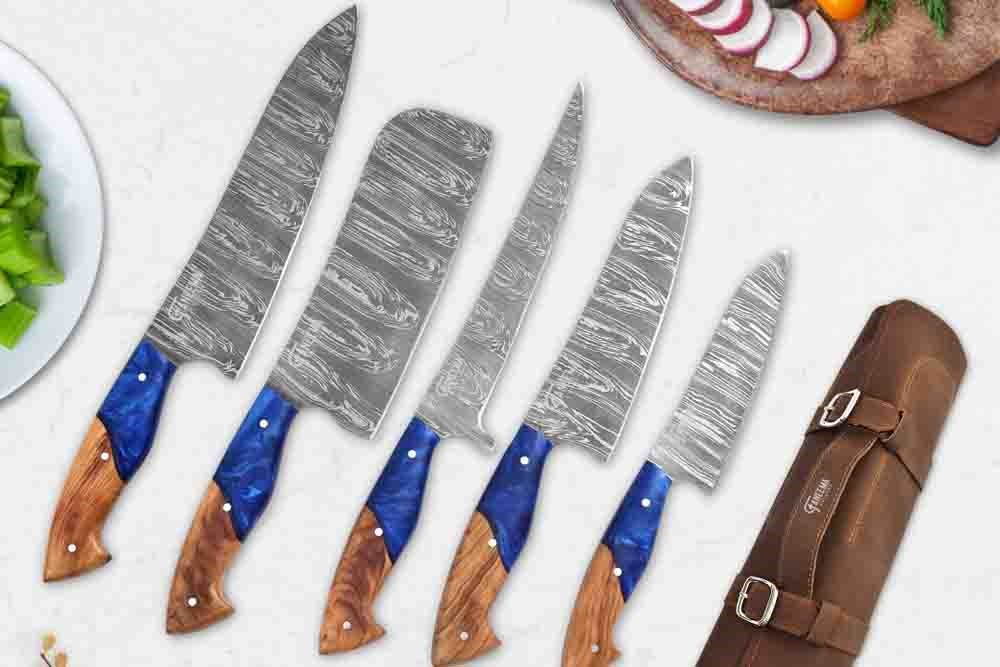The beauty of Damascus steel lies in its mesmerizing patterns and legendary sharpness. Today, this ancient artistry is reborn in the sleek, modern Damascus knife set. Understanding the nuances can be overwhelming if you’re considering adding this exquisite piece to your kitchen arsenal. Let’s delve into the world of Damascus knives to help you make an informed decision.
Understanding Damascus Steel
The magic behind Damascus steel lies in its intricate pattern, created through a time-honored process of folding and welding different steel types. This meticulous technique results in a blade that’s not only visually stunning but also boasts exceptional hardness and flexibility. While the pattern is undeniably captivating, it’s the underlying steel composition that truly determines the knife’s performance.
Key Factors to Consider When Purchasing a Damascus Knife Set
- Blade Material: The Damascus pattern is a visual treat, but it’s the core steel that dictates the knife’s edge retention and durability. Look for blades with high-carbon steel cores for optimal performance.
- Handle Material: A comfortable and secure handle is crucial. Popular choices include G10, Micarta, and Pakkawood. Each offers unique advantages in terms of durability, grip, and aesthetics.
- Knife Selection: A standard set typically includes a chef’s knife for versatile tasks, a paring knife for delicate work, and a serrated knife for bread. However, consider expanding your collection with a santoku or utility knife based on your cooking habits.
- Set Configuration: Decide if you need a complete set or a few essential pieces. Factor in your storage space and how often you’ll use each knife.
- Price: Damascus knife sets can range in price significantly. Determine your budget and prioritize the features that matter most to you.
Choosing the Right Set

Selecting the perfect Damascus knife set involves considering your unique cooking style and preferences. A home cook might prioritize versatility, while a professional chef may require specialized tools.
- Cooking Style: Analyze your culinary habits to determine the essential knives for your kitchen. If you frequently chop vegetables, a chef’s knife is indispensable. For delicate tasks like peeling and trimming, a paring knife is essential.
- Maintenance: Damascus Steel demands proper care to prevent rust and maintain its edge. Factor in the time you’re willing to dedicate to sharpening and storage.
- Brand Reputation: Research reputable brands known for their craftsmanship and customer service. Reading reviews can provide valuable insights into product quality and performance.
Care and Maintenance Of Damascus Knife Set
Investing in a Damascus knife set is an investment in your culinary experience. To prolong its life and maintain its sharpness, proper care is essential:
- Hand Wash Only: Avoid dishwashers, as harsh detergents can damage the blade.
- Dry Immediately: After washing, dry the knife thoroughly with a soft cloth to prevent water spots and rust.
- Sharpening: Invest in a quality sharpening stone or honing steel to maintain the knife’s edge.
- Storage: Store your knives in a dedicated knife block or magnetic strip to protect the blades from damage.
By following these guidelines, you can ensure your Damascus kitchen knife set remains in pristine condition for years to come.
Conclusion
A Damascus knife set is more than just a kitchen tool; it’s a statement piece that reflects your passion for cooking. By understanding the factors influencing quality and performance, you can select a set that perfectly complements your culinary endeavors. Remember, proper care and maintenance are essential to preserving the beauty and functionality of your investment.








